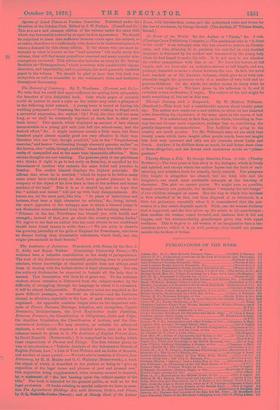The Reward of Constancy. By T. Woodman. (Provost and Co.)—
We wish that we could find space sufficient for setting forth adequately the beauties of this delightful book. Only whole pages of extracts could do justice to such a style as the reader may catch a glimpse of in the following brief extract. A young lover is vexed at having his wedding postponed :—" Guessing the cause, and wishing to dispel such a sorrowful expression, she replied, ' Ohl Fred, the time will not seem long, as we shall be constantly together, at least, that is, after your bank hours.' This speech, which displayed as amount of tact almost inconceivable in a young girl only just left the school-room, had the desired effect," &o. A single sentence sounds a little tame, but three hundred pages almost equally good are very effective in their way. Heroines who are "fair, though youthful," join in the " Terpsichorean exercise," and bestow "enchanting though sincerely genuine smiles" on the heroes, also" noble, though youthful," whom they love with the " sin- -oerity of unequalled and at the same time immutable affection." More serious thoughts are not wanting. The genuine piety of one gentleman who thinks it right to go to bed early on Saturday, is equalled by the devoutness of another who extends the same belief and practice to Sunday. The author himself displays the highest principle. He affirms that when ho is married," which he hopes to be before many more years have rolled away, he shall have greater pleasure in the company of the object of his love than in that of the noblest and fairest maidens of the land." This is is as it should be, and we hope that the " noblest and fairest " will put up with their disappointment. His heroes are, for the most part, like him. " In place of inebriation and laziness, they bear a high character for sobriety," &c., being, indeed, the exact opposites of the unhappy man to whom a learned judge in not dissimilar terms addressed from the bench this touching rebuke:— "Prisoner at the bar, Providence has blessed you with health and strength; instead of that, you go about the country stealing ducks." We regret to see that an author who has such claims to our confidence should have found reason to write thus :—" We are sorry to observe the growing partiality of the girls of England for Frenchmen, who have no deeper feeling than abominable selfishness, which fault, nay, sin, reigns pre-eminent in their breasts."


































 Previous page
Previous page